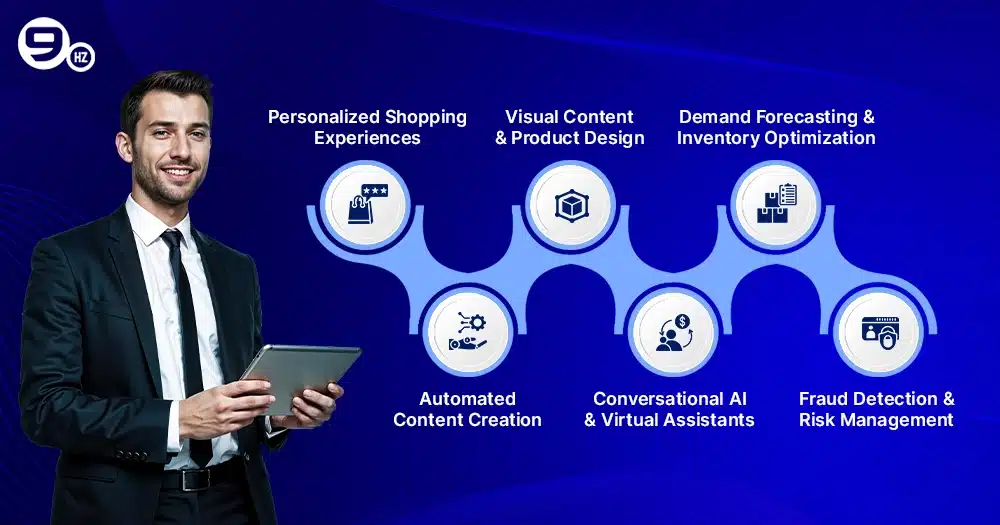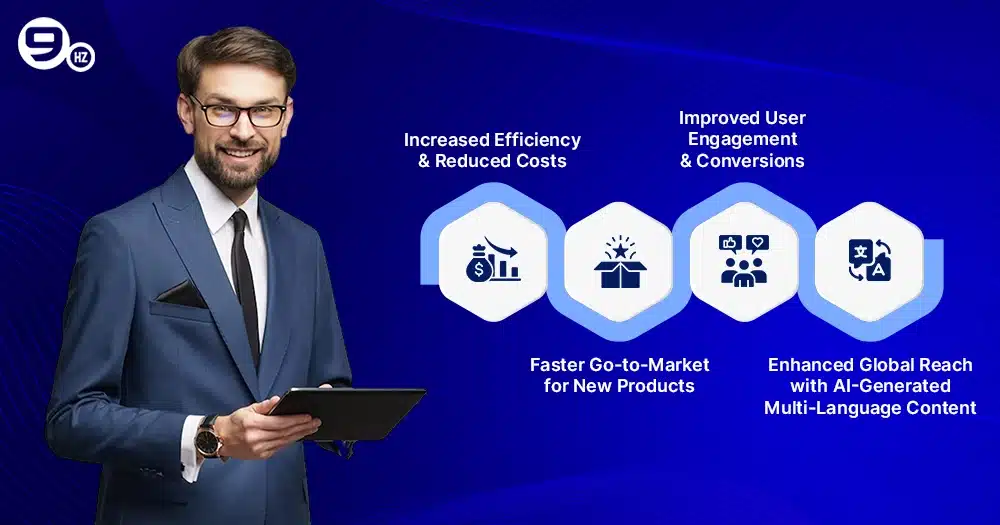Wouldn’t it make all the online walkthrough shopping seem like its development was a custom one? This is what Generative AI in eCommerce is allowing now. With the help of machine learning algorithms and natural language models, generative AI is changing the online store-customer relationship patterns. In a recent survey published by McKinsey, it is reported that AI in retail and eCommerce has grown by 60% in the past 3 years, and those companies that used AI tools to enhance personalization saw an increase in conversion rates up to 20% in 2024.
The increased role of AI and eCommerce is unquestionable. AI technology is expanding business activities and transforming customer expectations; in other words, it is changing from content generation to consumer interaction. With the continued adoption of more advanced AI solutions, eCommerce companies are witnessing increased personalization and an increase in customer service-driven decision-making, spurring a greater level of customer satisfaction.
What is Generative AI?
Generative AI represents a branch of artificial intelligence and is able to generate new content, namely text, image, video, or code, or even a product design, using large amounts of customer data and training data. In opposition to the conventional form of AI, which is primarily aimed at the analysis of customer information and at forecasting results, generative AI technology is proactively used to generate new results resembling the creativity of humans.
For example:
- Traditional AI within eCommerce may process history in order to forecast demand.
- In contrast, generative AI in eCommerce is able to automatically create product descriptions, tailored messaging and shopping experiences or even algorithm-based pricing using specific customer groups.
Some popular generative AI tools include:
- ChatGPT: To be used in customer enquiries, content development and ecommerce customer care.
- MidJourney: Allowing enterprises to develop AI-based imagery of products and catalogues.
- DALL·E: It also comes in handy when creating visual material (banners, mockups, and social media graphics).
- Jasper AI: Seymattering: popular in both content-generation and targeted marketing programs (SEO).
Generative AI tools allow businesses to merge machine learning algorithms with real-time customer feedback, thus contributing to the development of innovations and the possibility for ecommerce companies to increase customer experience and optimize their performance.
Why Generative AI is Important in eCommerce
Generative AI usage is becoming a necessity rather than merely a trend for modern online stores. As a matter of fact, a number of e-commerce businesses in the present day are combining eCommerce development services and AI implementation services to provide customized buyer and business management services. By acquiring information on customers, the AI technology assists brands by forecasting demand, improving customer engagement, and providing more strategic tasks with an even better level of precision.
The reason why generative AI is a game-changer in the eCommerce industry is as follows:
1. Personalization and Improved Customer Experience
The modern-day online shopper is looking forward to having a customized customer experience at each phase of their experience. Generative AI can help companies provide interactive descriptions of products, give more personalized recommendations, and even human-like search bar suggestions. Online stores can understand the behavior of customers, sentiment analysis and customer feedback better in order to gain more customers and create greater customer loyalty.
Example:
Amazon relies on state-of-the-art machine learning to gain an understanding of customers, browsing histories, and past purchases to recommend them products. Such unique iShopping experiences mean a lot better customer interaction and an increased conversion rate.
Pro Tip: Apply AI-enabled personalization to products and landing pages, banners, and email responses in order to make the most out of the conversion rates.
2. Faster Content and Product Catalog Creation
One of the most time-consuming activities of the eCommerce companies is the creation of content. The generative AI technology is capable of creating product descriptions, frequently asked questions, and marketing writing automatically to meet customer expectations. This guarantees quicker go-to-market of new products and also consistency across platforms. AI-boosted SEO articles also raise the level of visibility in search platforms, which lure prospective buyers to the e-commerce site.
Example:
Through AI-driven content generation, eBay creates an optimized analogy of product titles and descriptions of the listed products of millions to give them ample opportunity to find the products better and rank higher on search engines.
Launch, Grow, and Optimize your eCommerce Store Today.
3. Driving Innovation and Efficiency in Online Stores
Generative AI can also simplify business operations by enhancing inventory, supply chain optimization, and dynamic pricing strategies. Predictive analytics, complemented with past historical sales data, allow e-commerce companies to predict demand and prevent stockouts more accurately. This saves cost and boosts customer satisfaction at large since the products are made available whenever required.
Example:
Walmart uses AI in the optimization of its supply chain, demand planning, and predictive analytics to forecast customer demand and to think about stocking policies in thousands of stores and distribution centres.
Key Use Cases of Generative AI in eCommerce
Generative AI is not a dystopian concept, but the future is becoming a reality implemented by progressive businesses. Through collaboration with one of the Generative AI development company, e-commerce enterprises will be able to pursue plenty of growth opportunities in various fields. And let us take a glance at some of the most relevant use cases:
1. Personalized Shopping Experiences
Generative AI provides a personalized shopping experience by providing insight into customer data, customer behavior, and past sales data. AI algorithms and virtual assistants in e commerce businesses can be used to establish special marketing campaigns, individual customer support, and product descriptions that can change. This has the added benefit of not only enhancing customer engagement but also customer trust and loyalty, leading to better customer satisfaction and rate of conversion.
- The AI algorithms generate hyper-personalized product suggestions according to the customer’s preferences and past data.
- AI software creates personalized landing pages and custom descriptions of products that resonate with the expectations of customers.
- Virtual shopping assistants provide customers with personalized customer service, which increases their customer satisfaction.
2. Automated Content Creation
The Generative AI technology simplifies content deployment in the operation of an ecommerce business by creating product descriptions, frequently asked questions, and FAQs that are optimized for search. Using the tools of generative AI is an opportunity to enable ecommerce businesses to build specific offers that help them market their products increase their visibility in search engines, and find new customers. Such smooth harmonisation increases efficiency in operations, minimizes manual work, and imparts quicker go-to-market tactics and overall customer satisfaction and engagement tactics across ecommerce sites.
- Thousands of products can be described in a couple of minutes using AI.
- AI-driven copywriting enhances a focused marketing campaign on email, advertisements, and online retail stores.
- Online visibility is enhanced by the assistance of generative AI tools in the creation of SEO content, frequently asked questions, and blog posts.
3. Visual Content and Product Design
Generative AI in eCommerce assists in visual content creation and advanced platforms of merchandising with the generation of product mockups, banners, and catalog designs. E-commerce firms are applying AI systems, such as MidJourney and DALL-E, that take in product information and provide creative images that match customers’ expectations. This allows companies to anticipate their demand, improve customer communication and provide new shopping experiences that can lead to much customer loyalty as well as brand exposure.
- It is possible to design product mockups, catalog images and marketing banners using machine learning algorithms.
- It is possible to apply AI tools to ecommerce businesses and make them create creative visuals to use in seasonal campaigns, like MidJourney.
- Online stores can develop design tests of products before their introduction due to the improved capabilities of merchandising.
Revolutionize your Workflows with Generative AI Technology
4. Conversational AI & Virtual Assistants
Virtual assistants and conversational AI technology, on the basis of generative AI technology, enhance customer service in ecommerce by assisting with customer inquiries, customer question tracking, and customer interactions 24/7. The implication of this is that online stores employ AI algorithms, which in turn offer enhanced customer interactions, improved customer experience, and better customer service through personalization. These AI tools improve customer trust, efficiency and the ultimate customer satisfaction by allowing businesses to serve potential customers in real time.
- Customer service 24/7 AI chatbots provide answers in real time when the customer has a question related to ecommerce.
- Virtual agents serve to promote more effective product discovery options to online shoppers.
- Conversational AI increases customer interactions and builds long-term customer confidence.
5. Demand Forecasting & Inventory Optimization
Generative AI optimises inventory management and supply chain using predictive analytics and historical data. Ecommerce companies can make informed decisions, ensure optimal levels of stock and mitigate operational inefficiencies by predicting demand and analysing the customer segments. Not only will this prevent the situation where costs are saved, but the better service to customers cannot be overlooked because the goals and several expectations of customers were met, and the problem of stockouts in rapidly developing circumstances of online shopping was eliminated.
- Predictive analytics requires the use of historical sales records and customer demand trends to make a prediction.
- AI assists in the optimization of stock, lowering costs incurred in the supply chain and preventing excessive stocking.
- Through customer data, the business will be in a position to make sound decisions regarding the launch of a new product.
6. Fraud Detection & Risk Management
Fraud detection is enhanced by generative AI that applies machine learning algorithms and sentiment analysis to detect deviations in customer communications, fake reviews and fraudulent transactions. The fact that ecommerce firms have sophisticated risk management systems contributes to an increased level of customer trust and risk shielding of the business operation. Taking the initiative to use AI in eCommerce guarantees elevated customer satisfaction, a financial edge, and seamless conduct and coordination with current systems to enhance overall performance.
- Generative AI technology identifies fraud and anomalies, as well as fraudulent reviews.
- The AI algorithms track the behavior of customers to detect risks continuously.
- Solutions that boost the detection of fraud increase customer confidence and safely secure the business of ecommerce.
Benefits of Using Generative AI in eCommerce
Generative AI can revolutionize the e-commerce industry by allowing business to raise their expectations and operational efficiency at the same time. Gone are the days of slower content creation and sophisticated approaches to supply chains as AI tools reimagine the way online stores function and their interactions with online shoppers.
1. Increased Efficiency and Reduced Costs
Repetitive activities, like content generation, customer service and information gathering, are automated by generative AI so that teams can concentrate on more strategic activities. The benefits incurred by e-commerce firms in applying the generative AI solutions include reduced business costs, enhanced customer consultation, and the facilitation of business processes. For example, Shopify uses AI-enhanced descriptions to ease manual load and improve product discovery solutions.
Example:
Shopify launched its AI-based feature, Shopify Magic, that generates product descriptions on the merchant’s behalf. This minimizes manual effort and enhances reasonable product discovery solutions- enabling businesses to scale product catalogs at reduced costs.
2. Faster Go-to-Market for New Products
AI trained on historical sales data, as well as product data, can automatically create rules to describe products, create landing pages, and offer target marketing communication. This allows quicker product introduction and consistency. Nevertheless, other businesses, including Alibaba, rely on machine learning algorithms to provide dynamic price reductions and customized experiences at shopping, which allows the products to offer the most opportunities to potential users and to increase the purchasing rates.
Example:
Millions of listing Alibaba companies rely on AI-based machine learning algorithms to automate the creation of product content. This will guarantee quick access to selling, as well as speed to market, which will boost its existing competitive edge in the international online shopping.
3. Improved User Engagement and Conversions
Sentiment analysis, along with customer interaction and customer feedback, enables generative AI to improve customer engagement across ecommerce websites. An example is the number of conversions and customer retention, with a higher rate of customer retention and increasing customer revenue due to AI-driven proposals and personalized shopping bots. Sephora, for example, relies on AI chatbots as a guide to online shoppers, offering customized advice about the products and contributing to better customer satisfaction.
Example:
Sephora has AI-driven virtual assistants on its ecommerce platform and mobile application. These apps give individual product recommendations and beauty advice, making interactions with customers more personal and increasing the number of converted customers.
4. Enhanced Global Reach with AI-Generated Multi-Language Content
The generative AI technology is capable of automatic translation and localization of product and blog descriptions and marketing campaigns in different languages. This will help the ecommerce businesses reach a wide variety of customer organizations in other parts of the world, enhancing customers’ confidence and market penetration. By utilizing natural language AI to localize their catalog globally, Amazon manages to integrate smoothly multilingual content to enrich customer experience across the international markets.
Example:
Amazon utilizes tools of natural language AI that help it localize product lists in the international marketplaces. Such a process of integrating the descriptions of its products with multiple languages enables Amazon to serve a variety of customer groups and increase customer satisfaction on an international level.
Take your Retail Online with End-to-end eCommerce Development
Challenges of Generative AI in eCommerce
Regardless of its overall advantages, generative AI in eCommerce carries a number of challenges that companies in the field need to overcome in order to achieve long-term growth and customer-friendly services.
1. Data Privacy and Ethical Concerns
Challenge:
If so much data about customers is collected to train AI models, it poses some questions about how the data is acquired and whether customers can be trusted. Ecommerce firms need to ensure that they adhere to high standards of compliance, such as GDPR, so that they will not compromise customer data, but at the same time, maintain transparency in their business operations.
Solution:
Corporations must implement effective data governance models, anonymize the information of the customers, and introduce a policy of data acquisition through consent. Collaborating with a Generative AI development firm that values ethical AI would help to stay on track with compliance, whilst retaining customer confidence.
2. Maintaining Accuracy and Avoiding AI “Hallucinations”
Challenge:
Generative AI may at times generate wrong/incorrect, and misleading descriptions of products and customer service answers. Incremental insistence on the results can damage the hopes of the customers and also decline customer satisfaction. To make sure that the data will be reliable, businesses need to apply human control and the continuous refinement of training data.
Solution:
Firms need to create a human-in-the-loop manual of reviews to authenticate AI-generated product information, as well as queries made by their customers. Ongoing research based on new historical data and customer feedback assures that models produce robust results that are historically and contextually correct.
3. Over-Reliance on Automation
Challenge:
Although the AI algorithms automate a lot of activities, total reliance is harmful to the e-business customer service. Human intervention is needed when dealing with queries raised by customers involving empathy or extensive reasoning. Having a balance in automation and human support will be a million times better for customer service and increase customer loyalty.
Solution:
Ecommerce enterprises need to use a mixed model, which requires the virtual assistants to process basic customer interactions and human agents to provide services regarding more complicated or sensitive customer requests. This combination is efficient and does not affect customer satisfaction.
4. Integration Challenges with Existing eCommerce Platforms
Challenge:
Smooth integration between the generative AI technology and the current systems and ecommerce development services may not be easy. The barrier that businesses experience when integrating AI tools in customer service, supply chain management and search engines. Formal approach with replicable APIs is used to make its adoption effortless, at the same time keeping the operational efficiency and the satisfaction of the customer.
Solution:
Organizations ought to apply API-first solutions and modular AI platforms, which enable the easy incorporation into ecommerce sites. By collaborating with proficient ecommerce development solutions, there will be ease in maintaining the flow of AI tools within the already operating systems without necessarily disrupting the business activities.
Future of Generative AI in eCommerce
The future of Generative AI in eCommerce is going to transform the way internet-stores work, the way shoppers buy, and the way data-driven decisions are made by ecommerce companies. With the development of AI devices, we will probably use even more sophisticated apps to enhance the customer experience, supply chain, and business.
Trends to Watch
- AI Agents: The Virtual shopping aides would improve the virtual world, creating an artificial intelligence that allows the enterprises to address customer queries and customer inquiries, and product search, which can be approached in real time.
- Hyper-Personalization: Generative AI applications will create personalized customer experiences at scale by using large amounts of customer data, whether it is personalized pricing or personalized product selections.
- Voice Commerce: As natural language steps up, online consumers will rely on voice-activated e-commerce platforms to call orders, find items and receive customized services.
Example: Walmart is testing AI voice assistants to enable the use of natural language voice commands, allowing customers to add something to their cart to enhance the experience and general customer satisfaction
How AI Will Shape the Next Decade of Online Retail
Generative AI technology will drive the ecommerce companies towards the optimization of supply chains by automation, inventory management, predictive analytics, and ecommerce customer service. Through assessing historical data within areas of sales and customer behaviour, AI algorithms will enhance the economy in regard to more precise forecasting of the demand. Thus, the business can generate a higher-quality targeted advertising effort and elevate consumer dependability.
Additionally, the implementation of AI will foster smooth connectivity with the current systems with a view to attaining efficiency in operations within online stores. With enhanced merchandising systems or customized customer services, the ecommerce industry is on the cusp of an era where AI is both augmenting business capabilities and acquiring a loyal competitive advantage in the long term.
Conclusion on Generative AI in eCommerce
Generative AI in online shopping is changing the way online stores operate as it facilitates personalized, rich shopping experiences and more rapid creation of content, wiser inventory management, and more engaged interactivity with customers. Although issues such as information privacy and integration are not nonexistent, responsible adoption will provide long-term development and client loyalty.
The NineHertz is a reputable Generative AI development firm that supports ecommerce organizations to establish customized AI application that improves productivity, streamlines activities and promotes customer satisfaction. Through the flagella of AI tools in the right hands, your online business can achieve a competitive edge and determine the future of online retailing.
FAQs
1. What is Generative AI in eCommerce?
Generative AI in eCommerce is the application of machine learning algorithms and AI to interpret customer data and generate customized shopping experiences, design content automatically, and make business operations of ecommerce enterprises more efficient.
2. How does Generative AI improve customer experience in online stores?
Generative AI is utilized to improve customers’ experience: providing customized shopping recommendations, ready-made marketing campaigns and easy ecommerce customer support, increasing customer engagement, customer loyalty, and overall customer satisfaction within online stores.
3. Can Generative AI create product descriptions automatically?
Yes, AI generation engines are able to create product descriptions and FAQ as well as SEO content automatically. This enhances the good product discovery solutions, time saving and enhanced efficiency of the operational business processes in ecommerce.
4. What are the challenges of using Generative AI in eCommerce?
Problems regarded comprise privacy of data, inaccuracy, excessive reliance on automation, and compatibility with the existing systems. eCommerce enterprises have to create a balance between AI optimization and the supervision of human resources in order to achieve better customer relations.
5. What is the future potential of Generative AI in online retail?
Hyper-personalization, predictive analytics, supply chain optimization, and virtual shopping assistants are the future trends of AI in eCommerce to help businesses fulfill customer expectations and attain sustainable competitive advantage.
Great Together!











